Understanding the Critical Role of Early Mental Health Support
Early mental health support is a vital component of fostering lifelong emotional, social, and cognitive well-being. Recognizing the importance of timely intervention can dramatically alter the trajectory of mental health outcomes across all ages, particularly in childhood, adolescence, and young adulthood. This article explores why early detection and support are crucial, how they can be implemented effectively, and the profound benefits they provide to individuals and communities alike.
The Foundations of Childhood Mental Health
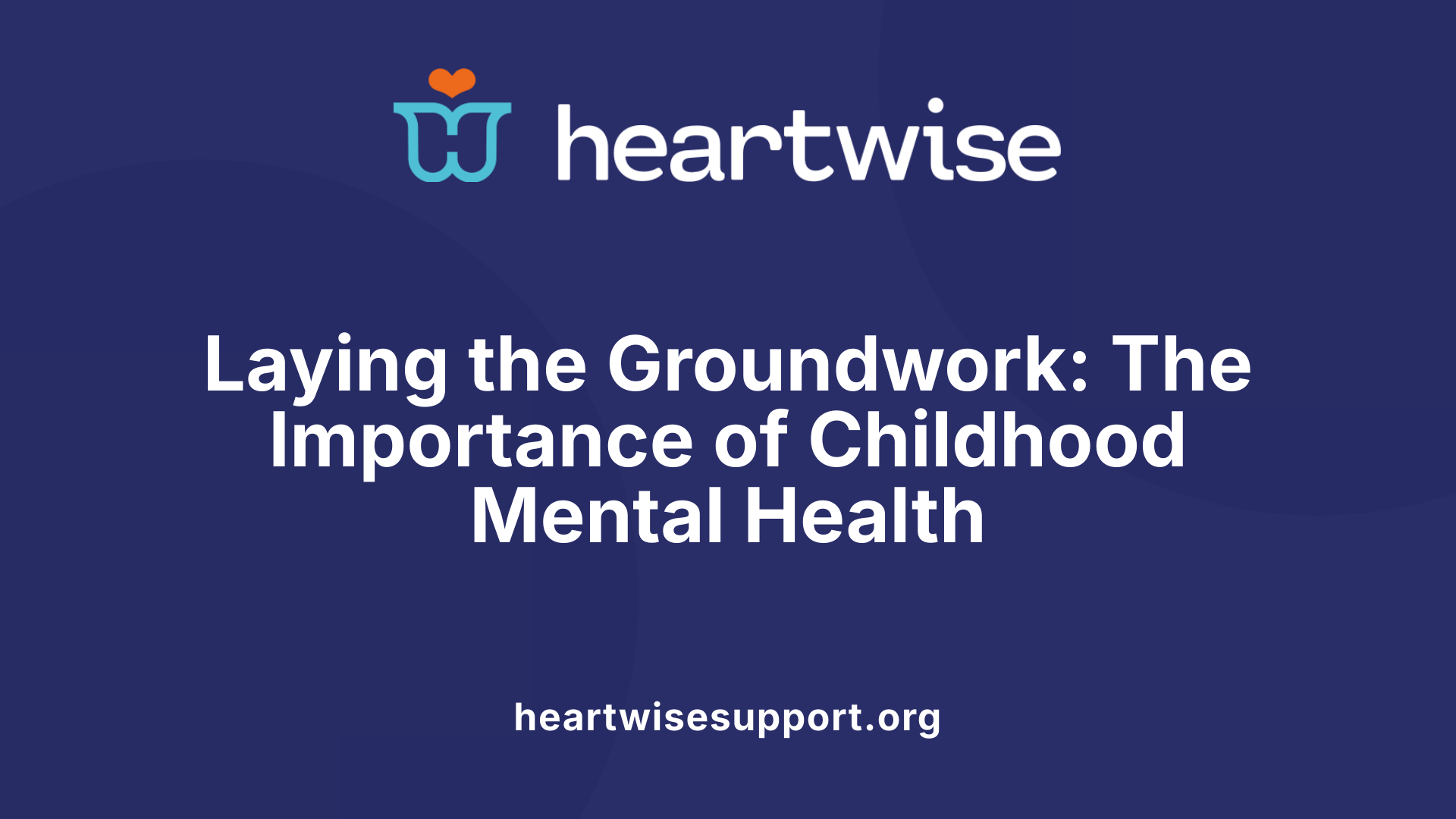
Why is early childhood mental health important?
Early childhood mental health is essential because it lays the groundwork for a person's long-term emotional, social, and cognitive development. During these formative years, a child's brain undergoes rapid growth, with most brain structures forming by age two. Positive early experiences help build a strong neural foundation, influencing future learning, relationships, and overall well-being.
When young children face behavioral or emotional problems, addressing these issues early can prevent more significant difficulties later in life. Early mental health supports enable children to develop resilience, social skills, and emotional regulation, which are vital for navigating life's challenges.
Fostering good mental health from an early age also combats stigma around mental health conditions. When families and communities understand the importance of early mental health care, children are more likely to receive timely support.
Providing early intervention ensures that children acquire healthy coping skills and emotional intelligence, setting them on a path toward healthier adult lives. Recognizing and addressing mental health early in childhood not only promotes overall well-being but also reduces the risk of long-term mental health problems and enhances their ability to thrive socially, academically, and emotionally.
Impact on lifelong development
Early mental health significantly impacts lifelong development by shaping brain architecture and emotional resilience. Children who receive appropriate support develop better problem-solving skills, adaptability, and social competence.
This early foundation influences their capacity to handle stress, form relationships, and succeed academically. Conversely, untreated mental health issues in childhood can lead to ongoing challenges, including academic struggles, social withdrawal, and increased risk of mental illnesses in adulthood.
Intervening early helps ensure children grow into confident, emotionally stable adults capable of maintaining healthy relationships and managing life's pressures effectively.
Prevention of future difficulties
Investing in early mental health prevention benefits society by reducing future healthcare costs and improving quality of life. Early intervention can prevent the escalation of behavioral and emotional problems, decreasing the likelihood of developing chronic mental health conditions like depression or anxiety.
Programs that support mental health in early childhood—such as parenting education, social skills training, and accessible mental health services—serve as vital preventative tools. These efforts help children develop a strong emotional base, which reduces the chances of encountering complex problems later.
Through early detection and supportive intervention, we can help children grow into well-adjusted adults, free from many of the complications associated with untreated mental health issues. Promoting mental health from a young age is, therefore, a fundamental step toward healthier, more resilient communities.
The Power of Early Detection and Support
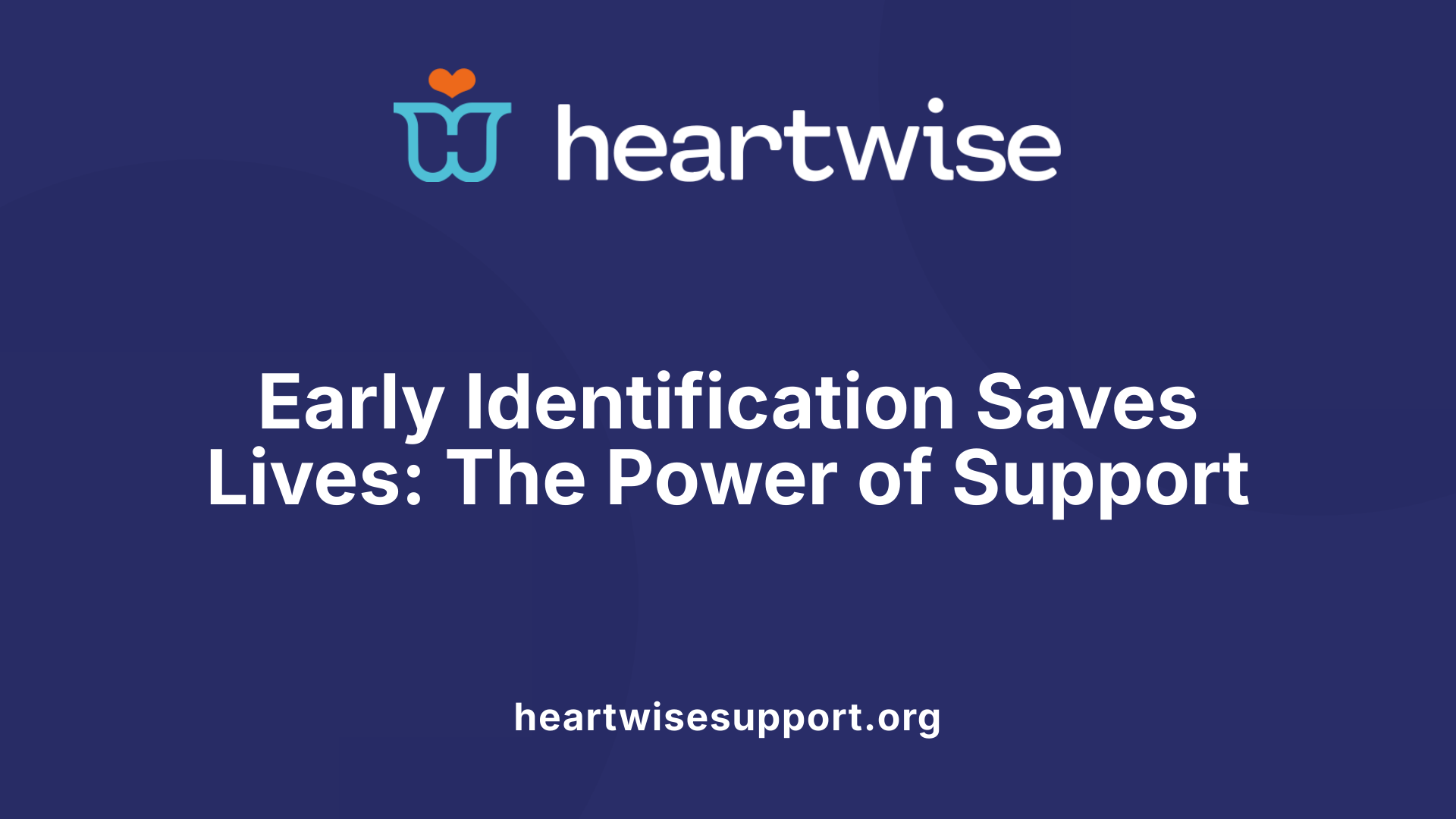
Why is early detection of mental health important?
Early detection of mental health conditions is crucial because it enables timely intervention, which can significantly improve long-term outcomes. Recognizing symptoms early helps individuals understand what they are experiencing and encourages them to seek help before symptoms worsen or lead to complications.
Routine screenings and awareness about early signs assist in identifying at-risk individuals, especially during childhood and adolescence when many mental health issues tend to develop. Early detection can prevent the escalation of symptoms, reduce the risk of hospitalization, and break the cycle of avoidance and worsening conditions.
By diagnosing issues early, people can access effective treatments such as therapy, medication, or support groups tailored to their needs. This proactive approach not only enhances recovery chances but also improves quality of life, social relationships, and academic or work performance. Altogether, early mental health detection is a vital step toward fostering resilience and overall well-being.
How do routine mental health screenings help?
Integrating mental health screenings into healthcare, schools, and community programs plays a vital role in early identification. These assessments can detect signs of distress in individuals who might not yet realize they need help.
Regular screenings help uncover issues like anxiety, depression, or emotional difficulties at an early stage, especially in youth, when symptoms may be subtle or mistaken for typical developmental challenges. This allows for quicker intervention, whether it involves professional therapy, counseling, or other support resources.
Promoting widespread awareness and reducing stigma around mental health also encourages more people to participate in screenings. Over time, this builds a community culture attentive to early signs and supportive of seeking help.
What signs and symptoms should we watch for?
Recognizing early warning signs is essential for prompt action. Common indicators include persistent sadness, hopelessness, difficulty concentrating, significant changes in sleep or appetite, irritability, excessive worry, physical symptoms like fatigue, withdrawal from social activities, sudden personality shifts, and thoughts of self-harm or suicide.
In children and adolescents, signs may manifest as academic decline, social withdrawal, behavioral outbursts, or physical complaints without medical cause. Teachers, parents, and caregivers should be vigilant for emotional or behavioral changes lasting weeks or more, as these can signal emerging mental health issues.
Early intervention upon noticing these signs can facilitate professional help, teaching coping skills and emotional regulation to prevent the development of more severe problems. Increased awareness and proactive support are instrumental in safeguarding mental health from a young age.
Intervening Early: Strategies and Benefits
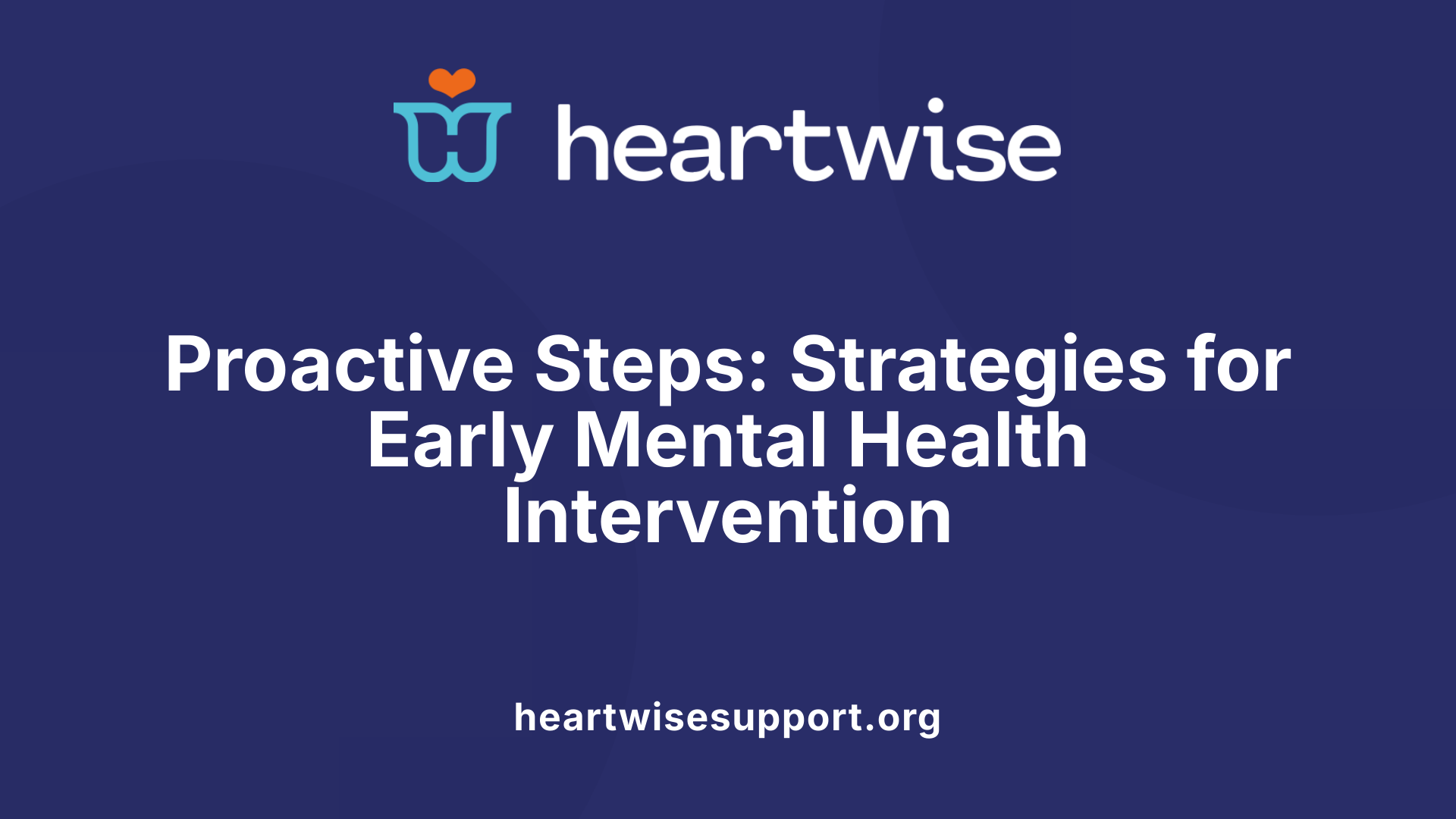
Why is early intervention for mental health important?
Early mental health intervention is vital because it allows for the recognition and treatment of mental health problems before they become more severe or chronic. Addressing issues at the initial signs—such as persistent sadness, withdrawal, or behavioral changes—can significantly improve prognosis. By using assessment tools and evidence-based treatments like cognitive-behavioral therapy (CBT), dialectical behavior therapy (DBT), medication, or peer support early on, individuals often experience reduced symptom severity and better overall recovery.
Implementing early support also helps minimize disruptions to daily routines, including work, school, and relationships. It fosters the development of coping and emotional regulation skills that are essential for long-term resilience. Importantly, early intervention can prevent secondary complications such as substance abuse, self-harm, or additional mental health conditions.
Recognizing and acting upon early warning signs dramatically boosts the chances of full recovery. It diminishes the likelihood of hospitalization and long-term disability, improves quality of life, and supports healthier social and emotional development. For youth populations, particularly teenagers and children, early detection and treatment are crucial, as many mental health issues begin early and can worsen without timely intervention.
Addressing the Broader Impact
What is the importance of mental health support?
Mental health support plays a crucial role in helping individuals cope with everyday challenges and maintain their overall well-being. It provides a safe space to express feelings of sadness, anxiety, and hopelessness, which are normal but can develop into serious issues if ignored.
Early support encourages people to seek help before problems escalate, reducing the risk of long-term disability or chronic illness. It fosters emotional resilience, enabling individuals to manage stress effectively and build healthy relationships.
Beyond individual benefits, mental health support enhances social cohesion by creating understanding and reducing stigma. It contributes to healthier communities where people are more likely to seek assistance without fear of judgment.
Investments in mental health services, including policy and resource allocation, help establish accessible, affordable care. These efforts can include integrating mental health screenings into schools and workplaces, expanding community programs, and training healthcare providers.
Ultimately, supporting mental health across society leads to improved productivity, lower healthcare costs, and a more compassionate environment.
Community and societal benefits
Providing early mental health intervention within communities reduces the burden on healthcare systems and enhances overall societal well-being. When communities prioritize mental health, they experience lower rates of substance abuse, self-harm, and school or workplace dropouts.
Supporting mental health also leads to stronger social networks, better academic and employment outcomes, and reduced social disparities. It fosters a culture of openness, understanding, and proactive care.
Stigma reduction
Reducing stigma around mental health encourages more individuals to seek help early, which leads to better treatment outcomes. Public awareness campaigns, education programs, and open dialogues about mental health challenge misconceptions and normalize these conditions.
Normalizing mental health concerns makes it easier for families, schools, and workplaces to implement supportive policies and practices.
Policy and resource allocation
Allocating sufficient resources for mental health services — such as funding dedicated programs and increasing the number of trained professionals — is essential for expanding access and improving quality of care.
Policies that promote early detection, integrate mental health into broader health and social services, and support research contribute to better outcomes. Governments and organizations worldwide are recognizing this need and investing accordingly, like the Biden Administration’s proposal to double mental health professionals in schools.
In conclusion, early mental health support not only benefits individuals but also strengthens societal fabric, reduces stigma, and ensures sustainable, comprehensive care.
The Role of Schools and Community Programs
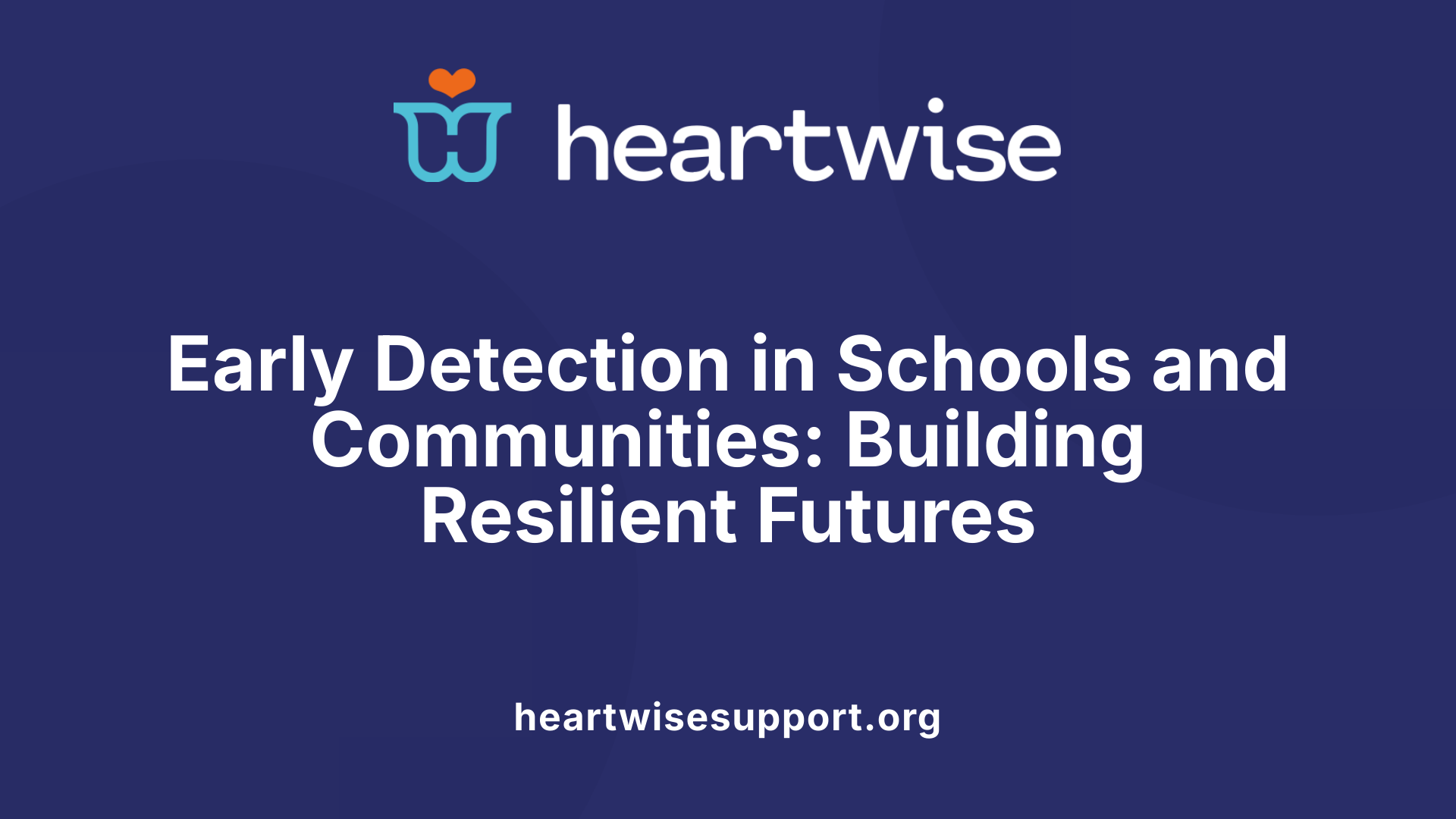
Why is early detection of mental health important?
Early detection of mental health conditions is crucial because it allows for interventions that can significantly improve long-term outcomes. When issues are identified early, individuals are more likely to respond well to treatments such as therapy or medication, which can reduce symptoms and prevent the development of more complex or chronic problems.
Schools and community programs play a vital role in early detection through implementing screening initiatives and providing mental health education. Routine screenings in schools can catch warning signs like mood changes, withdrawal, or academic decline, enabling prompt support.
Collaborative efforts among schools, healthcare providers, and community organizations enhance the effectiveness of early interventions. These partnerships facilitate resource sharing, training, and the development of supportive environments for children and adolescents.
Early screening initiatives are designed to identify at-risk youth before symptoms worsen. Programs such as school-based mental health screenings are gaining recognition as effective tools for early detection and treatment, helping young people develop resilience and emotional skills.
By fostering awareness, reducing stigma, and establishing accessible mental health services within schools and communities, these efforts aim to support healthier, more resilient populations. Investing in such programs ensures that mental health support is integrated into everyday environments, making early intervention more achievable and impactful.
Innovative Tools for Early Detection
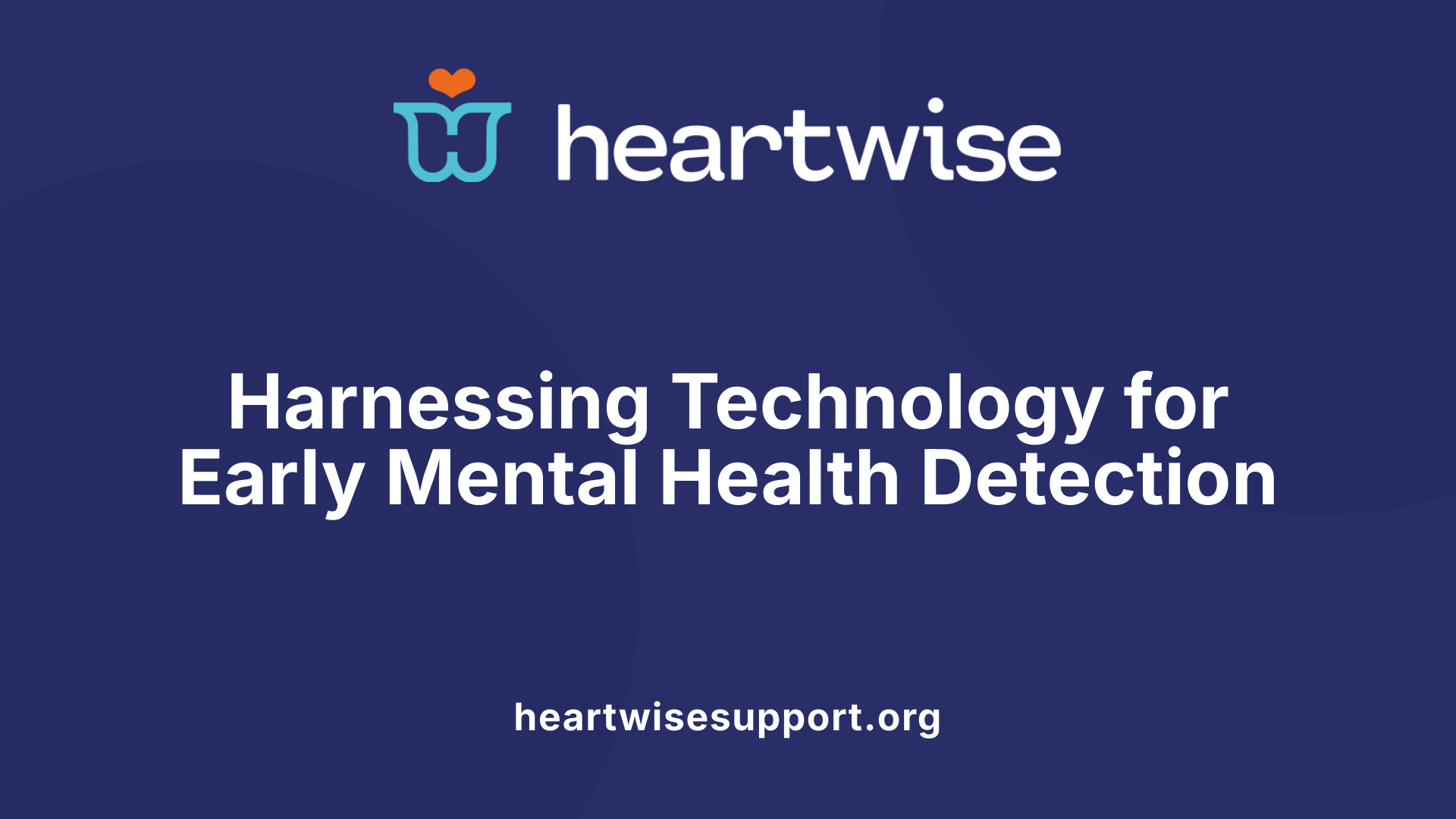
Why is early detection of mental health important?
Early identification of mental health issues is crucial because it enables timely intervention, which can significantly improve individual outcomes. When symptoms are recognized early, treatment can be more straightforward, leading to faster recovery and better management of conditions like anxiety and depression. It also allows individuals to understand their emotional states better, respond with appropriate therapies or medications, and access support systems before problems become severe.
Modern digital tools are transforming how we detect mental health concerns at an early stage. One such innovative solution is Emotii, an AI-based platform designed to identify early signs of mental health issues through behavioral and emotional data analysis.
Digital tools like Emotii
Emotii uses inputs like text messages, social media activity, and biometric data from wearable devices to monitor emotional and behavioral patterns continuously. Natural language processing (NLP) and machine learning algorithms analyze this information to detect subtle signs that might indicate emerging mental health challenges, such as anxiety or depression.
In practice, Emotii has shown promising results, such as accurately identifying early symptoms in university students, which facilitated timely support. Such tools can alert healthcare providers, educators, or even individuals themselves to seek help before conditions worsen.
Data analysis and privacy considerations
While digital tools hold great potential, they also raise questions about data privacy and security. Protecting sensitive mental health data is vital to maintain user trust and comply with regulations like HIPAA. Developers and healthcare providers must ensure robust security measures, transparent data policies, and user consent procedures.
Effectiveness in real-world scenarios
Real-world applications of early detection tools like Emotii demonstrate significant benefits. In workplaces, such tools help monitor stress levels and prevent burnout, contributing to healthier work environments. In educational settings, they support students' mental health by providing early alerts and access to counseling services.
Overall, integrating innovative, privacy-conscious digital tools into healthcare and community programs can dramatically enhance early detection efforts. This proactive approach not only saves resources but also aligns with preventive mental health care strategies aimed at improving long-term quality of life.
| Tool | Application Area | Benefits | Challenges |
|---|---|---|---|
| Emotii | Student and workplace monitoring | Early detection, timely support, improved outcomes | Privacy concerns, integration issues |
| Digital assessments | Healthcare settings | Standardized, accessible screenings | Data security, accuracy |
| Mobile apps | Public awareness and self-assessment | Increased engagement, destigmatization | User reliability, privacy |
Efforts to develop and implement these tools represent a significant step forward in making mental health care more accessible, effective, and personalized for diverse populations.
Long-Term Benefits and Societal Change
Why is early mental health support important?
Early mental health support plays a crucial role in shaping healthier individuals and communities. By addressing issues at their onset, it helps individuals develop effective coping mechanisms, emotional regulation, and resilience. Recognizing warning signs early enables professional intervention, often resulting in better treatment outcomes. This proactive approach not only alleviates current symptoms but also prevents conditions from escalating into more severe or chronic illnesses.
Providing timely support can reduce secondary complications like substance abuse, self-harm, and the development of additional mental health disorders. It empowers children and adolescents to navigate social and academic challenges effectively, laying a strong foundation for their future well-being. Furthermore, early intervention minimizes emotional and financial stresses on families, fostering a more supportive environment conducive to recovery.
In the long run, early mental health support leads to significant societal benefits. It decreases overall healthcare costs by reducing the need for extensive, intensive treatments later. It also promotes a culture of understanding and acceptance, which helps diminish stigma, encouraging more people to seek help without fear of judgment. Ultimately, supporting mental health early contributes to a more resilient, productive society where individuals can thrive both personally and professionally.
Fostering a Healthier Society Through Early Support
Investing in early mental health support not only benefits individuals and families but also propels communities toward healthier, more resilient futures. Early detection, intervention, and awareness reduce stigma, lower long-term healthcare costs, and promote emotional well-being across generations. Progress in policy and community programs, including innovations like digital screening tools, continues to expand access and effectiveness. The collective effort to prioritize early mental health support is a vital step in creating a society where everyone can thrive emotionally and physically.
References
- The Power of Early Intervention in Mental Health: A Pathway to ...
- The Importance of Early Intervention for People Facing Mental ...
- Importance of Early Mental Health Treatment - Aspire Frisco
- The Importance of Early Intervention in Mental Health Issues
- Why Early Intervention for Youth Mental Health Matters
- The Benefits of Early Mental Health Support Intervention
- Why Early Intervention for Mental Health Is So Important
- Early Recognition and Effective Treatment of Early Serious Mental ...
- Early Intervention Can Save Lives | NAMI
- Early intervention in youth mental health: progress and future ...











